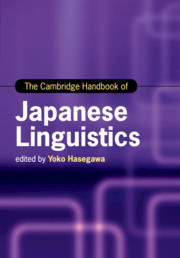Crossref Citations
This Book has been
cited by the following publications. This list is generated based on data provided by Crossref.
Kimoto, Yukinori
2020.
Handbook of Japanese contrastive linguistics.
Journal of Japanese Linguistics,
Vol. 36,
Issue. 2,
p.
291.
De Fina, Anna
and
Georgakopoulou, Alexandra
2020.
The Cambridge Handbook of Discourse Studies.
Ryding, Karin
and
Wilmsen, David
2021.
The Cambridge Handbook of Arabic Linguistics.
Singerman, Adam Roth
2021.
On finite embedded clauses in Tuparí: their synchrony, diachrony, and typology.
Glossa: a journal of general linguistics,
Vol. 6,
Issue. 1,
Ahmadian, Mohammad Javad
and
Long, Michael H.
2021.
The Cambridge Handbook of Task-Based Language Teaching.
Ayres-Bennett, Wendy
and
Bellamy, John
2021.
The Cambridge Handbook of Language Standardization.
Diegoli, Eugenia
2022.
“Sorry for your consideration”: The (in)adequacy of English speech act labels in describing ‘apologies’ and ‘thanks’ in Japanese.
Intercultural Pragmatics,
Vol. 19,
Issue. 5,
p.
621.
Mitsugi, Sanako
and
Fukuda, Haruka
2022.
Maternal passives addressed to Japanese-speaking children: A usage-based approach.
First Language,
Vol. 42,
Issue. 5,
p.
628.
Sartori, Manuel
2022.
Lapsus et apposition de rectification de l’arabe.
Historiographia Linguistica,
Vol. 49,
Issue. 1,
p.
1.
Hasegawa, Nobuko
2023.
Hideki Kishimoto: Analyzing Japanese Syntax: A Generative Perspective
.
Journal of Japanese Linguistics,
Vol. 39,
Issue. 2,
p.
289.
Jabłoński, Arkadiusz
2023.
Unique or universal. Japan and its Contribution to World Civilization, Volume 2. 100 Years of Japanese Studies at the University of Warsaw.
Stephenson, Alex
Ponsonnet, Maïa
and
Allassonnière-Tang, Marc
2024.
‘Reflexemes’ – a first cross-linguistic insight into how and why reflexive constructions encode emotions.
STUF - Language Typology and Universals,
Vol. 77,
Issue. 1,
p.
141.



